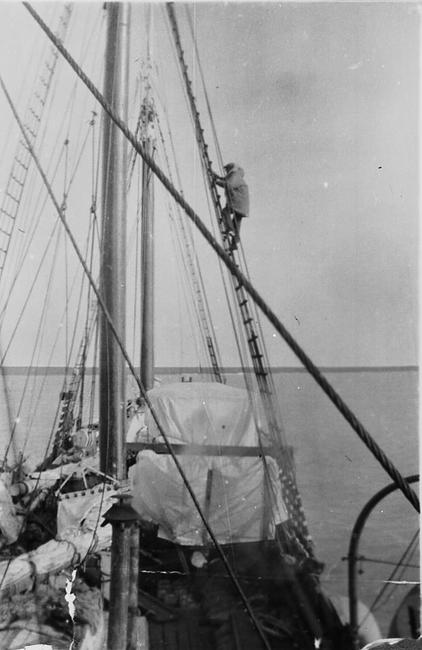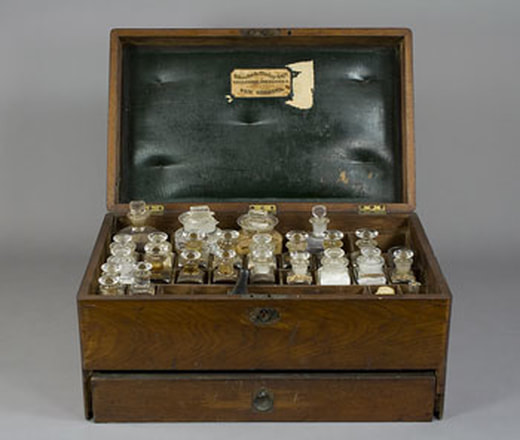 Norwegian-American whaling captain C. T. Petersen climbing the rigging, circa 1935. Courtesy New Bedford Whaling Museum Norwegian-American whaling captain C. T. Petersen climbing the rigging, circa 1935. Courtesy New Bedford Whaling Museum By Joan Lowenthal Recently a visitor to the Museum was reading an excerpt from the displayed logbook of the whaleship the Sheffield. He read that on Thursday, May 21st, 1846 while taking in sail at sunset, Scudder Abbott, a crew member on the Sheffield, lost hold and fell about 70 feet from the topsail yard to the deck. He became delirious and blood ran from his mouth and nose. He was immediately taken to the cabin and bled and made as comfortable as possible. The next day he was at times sensible and then again quite deranged. The visitor wanted to know if Abbott survived the fall. Did he? Whaleships and the nature of the whaling industry were dangerous, and the Sheffield was no exception. She was the largest whaler sailing out of Long Island, and the third largest whaler in the US. She was purchased in 1845 by the Cold Spring Whaling Company and boasted an impressive history of speedy, having broken records by crossing the Atlantic in only 16 days. Onboard whalers, there were commonly shipboard accidents, fighting, illnesses, food poisoning, drowning, and of course the dangers of hunting a powerful whale. Captains were responsible for dealing with illnesses and injuries aboard. They used their limited medical knowledge and supplies from the onboard medicine chest. Starting in 1790, the medical chest was part of legal required equipment on all American ships of 150 tons or more with ten or more people on board. The chest contained vials of drugs from powdered rhubarb to arsenic, identified by numbers which corresponded to recommendations outlined in a list of symptoms. During a time when doctors may not have been much more knowledgeable than the captains themselves, many times the treatments were worse than the injury or illness! After Scudder Abbott fell, as the logbook records, he "was taken up senseless in the cabin and bled and everything that we know of to make him comfortable." Considered one of medicine’s oldest practices, bloodletting was the standard treatment for various diseases. The logbook continues to document his recovery. The following day, he was "at times sensible and then again quite deranged." On Saturday, May 23, 1846, Abbott was "still out of his head but he was able to sip some soup and drink some sage tea." Sage tea has been used medicinally throughout history to help improve a variety of health issues. Two days later, the logbook records light squalls of wind and rain, and states Abbott seemed more rational and appeared to be “in the gaining hand.” Thursday, May 28th, after noting fog and unpleasant weather, the logbook records: “The invalid Abbott is much the same as yesterday, rather stronger but rather out of his head.” Abbott is briefly mentioned thereafter. On Sunday, June 14th, 1846, the logbook states, "Right Whales were chased sometime without success. Abbott was well enough to stay on deck all day for the first time since he fell from aloft." But the very next day, he remained forward in his bunk. The last entry about Abbott was on Friday, October 8th, 1846. The logbook simply stated that "S. Abbott rather better." Nothing is known about Abbott past this point, even after searching crew lists. With his lucky survival, he quietly vanished back into the workforce of thousands of crew members who faced incredible and serious risks in order to light the world. For more information on medical practices on board a whaleship check out Hen Frigates Passion and Peril, Nineteenth-Century Women at Sea by Joan Druett (A Touchstone Book Published by Simon and Schuster, 1998).
15 Comments
|
WhyFollow the Whaling Museum's ambition to stay current, and meaningful, and connected to contemporary interests. Categories
All
Archives
May 2024
AuthorWritten by staff, volunteers, and trustees of the Museum! |


 RSS Feed
RSS Feed
